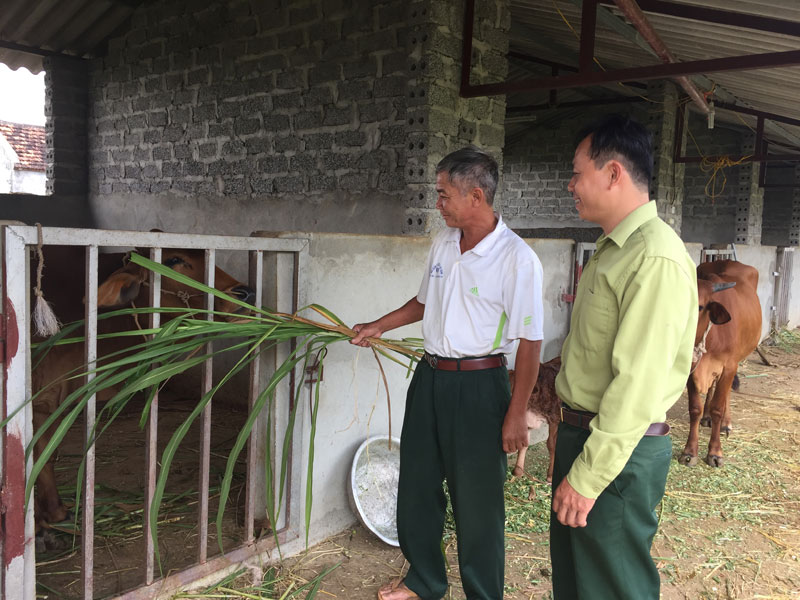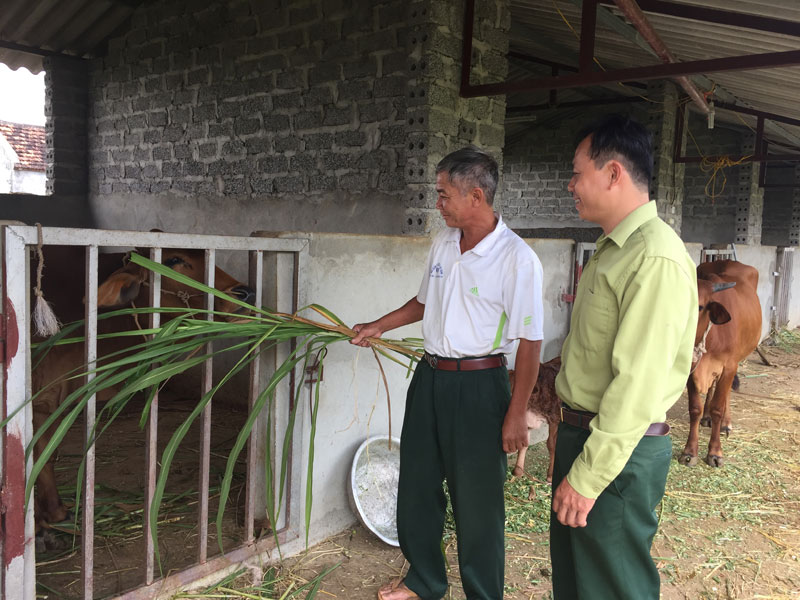
(HBO)- Promoting the quality of "Uncle Ho's soldier" on a peaceful economic front, the Veterans Association of Yen Tri commune (Yen Thuy) always accompanies and creates the conditions for the cadres and the members to build the economic models, rising to be rightfully enriched, getting sustainable poverty reduction. In 2018, the average income of the members reached 32.5 million VND a year, the rate of the poor households decreased to 3.6%.

The model of breeding cows of the Veterans
family, Mr. Nguyen Van Bien in Dong Tam hamlet.
The Veterans Association of Yen Tri commune
has 412 members, taking part in the 14 branches’ activities. Determining the
economic development as a key task of the associations, the veteran members
actively propagate and mobilize their officials and members to change the way
of thinking, the way of carrying the tasks, boldly changing the structure of
plants and animals, applying scientific and technological advances into the
production. They also utilize the available potentials and the advantages of
the local area to promote the efficiency of the economic models, integrated
breeding, citrus tree planting and service business. The whole commune
currently has 5 farms, 3 businesses owned by veteran members with many
effective breeding and farming models. Some households have income from 50-500
million VND a year. Typically, the veteran family members, Nguyen The Hung (A
Dong village), Pham Van Nguyen (Yen Tien village), Bui Van Duc (neighbors Ao
Hay) and so on.
Not only Mr. Bien, a lot of other veteran
members in the whole Association have been facilitated to access the capital
from the Social Policy Bank of the district with the debt of 5.6 billion VND.
The association maintains 7 saving groups to help 260 households get loans for
economic development. All levels of the Association actively propagated and
mobilized their members to build fund with the amount of 500,000 VND per member
a year to implement loan programs and social security activities. Besides, the
commune’s Veterans Association has cooperated with other departments, branches
and unions to organize training activities and transfer scientific and
technological advances, creating
opportunities for the members to exchange and share experiences to support
mutual development.
According to data from the Hoa Binh Provincial Party Committee, the industrial production index for the first six months of 2025 is estimated to have increased by 20% compared to the same period last year. This marks the highest year-on-year growth rate for this period since 2020.
In the first six months of 2025, Hoa Binh province’s export turnover was estimated at 1.145 billion USD, marking an 18.11% increase compared to the same period in 2024. Import turnover was estimated at $ 804 million, a 17.15% increase, which helped the province maintain a positive trade balance.
The lives of the ethnic minority farmers in Tan Lac district have gradually improved thanks to the new directions in agricultural production. This is a testament to the collective strength fostered through the professional associations and groups implemented by various levels of the district’s Farmers’ Union.
With the motto the "product quality comes first,” after nearly one year of establishment and operation, Muong village’s Clean Food Agricultural and Commercial Cooperative, located in Cau Hamlet, Hung Son Commune (Kim Boi district), has launched reputable, high-quality agricultural products to the market that are well-received by consumers. The products such as Muong village’s pork sausage, salt-cured chicken, and salt-cured pork hocks have gradually carved out a place in the market and they are on the path to obtaining the OCOP certification.
In the past, the phrase "bumper harvest, rock-bottom prices" was a familiar refrain for Vietnamese farmers engaged in fragmented, small-scale agriculture. But today, a new spirit is emerging across rural areas of Hoa Binh province - one of collaboration, organisation, and collective economic models that provide a stable foundation for production.
Maintaining growing area codes and packing facility codes in accordance with regulations is a mandatory requirement for agricultural products to be eligible for export. Recently, the Department of Agriculture and Environment of Hoa Binh province has intensified technical supervision of designated farming areas and packing facilities to safeguard the "green passport" that enables its products to access international markets.



